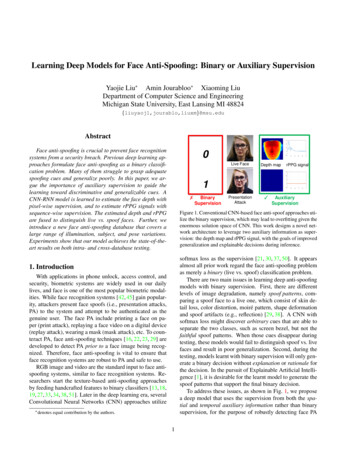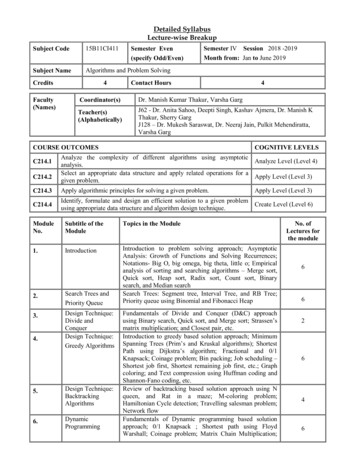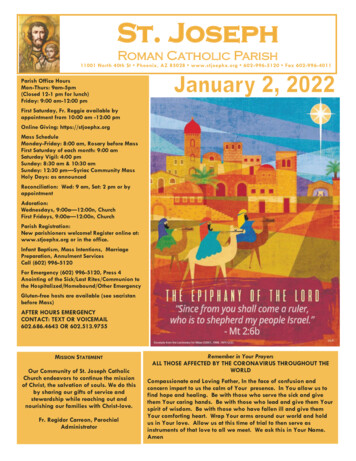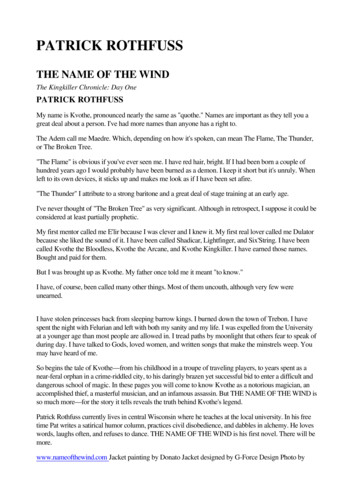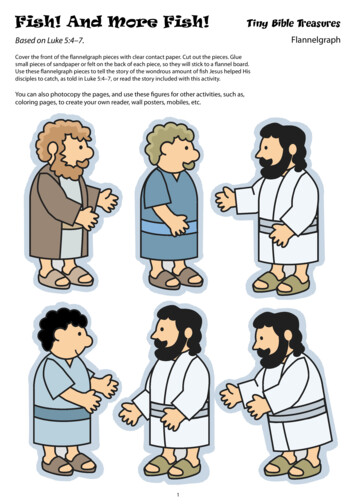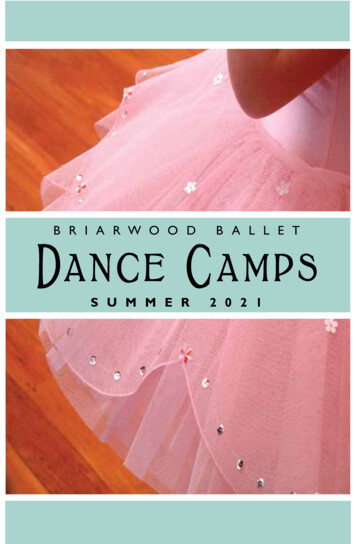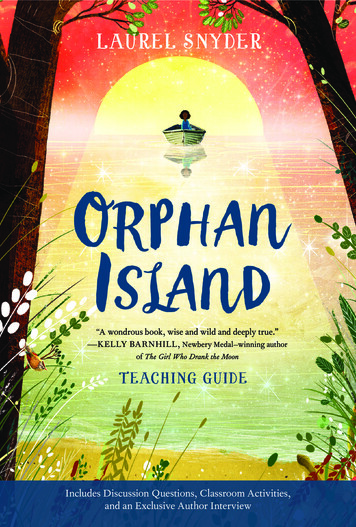
Transcription
“A wondrous book, wise and wild and deeply true.”— KELLY BARNHILL , Newbery Medal–winning authorof The Girl Who Drank the MoonIncludes Discussion Questions, Classroom Activities,and an Exclusive Author Interview
About the BookOn the island, everything is perfect. The sun rises in a skyfilled with dancing shapes; the wind, water, and trees shelterand protect the nine children who live there; when they go tosleep in their cabins, it is with full stomachs and joyful hearts.Only one thing ever changes: on that day, each year, when aboat appears from the mist upon the ocean carrying one youngchild to join them--and taking the eldest one away, never toreturn.Today’s Changing is no different. The boat arrives forJinny’s best friend, Deen, replacing him with a new littlegirl named Ess and leaving Jinny as the new Elder. Jinnyknows her responsibility now—to teach Ess everythingshe needs to know about the island, to keep things asthey’ve always been. But will she be ready for the inevitableday when the boat will come back—and take her away from the only home she’s known, forever?Acclaimed author Laurel Snyder returns with a powerful, original, unforgettable story of growingup—the things we fight to hold on to, and the things we struggle to let go.Nine on an island, orphans allAny more, the sky might fallPhoto by Sonya NaumannAbout the AuthorLaurel Snyder is a graduate of the Iowa Writers’ Workshop, and theauthor of many books for children, including Bigger than a Breadbox,an ABC Best Books for Children Selection; Penny Dreadful, anE. B. White Read-Aloud Award Honor Book; and Swan: The Lifeand Dance of Anna Pavolova, an ALA-ALSC Notable Children’sBook and a Parents’ Choice Silver Honor Book. Though she grew upin Baltimore, Laurel now lives in Atlanta, far from the water. Often,she spends her nights dreaming of waves, salt air, and bonfires inthe sand. Visit her online at www.laurelsnyder.com to learn more.
Pre-Reading ActivityHave students journal about the following prompt: Imagine what it would be like to live in a placewith only kids, no adults. How would this be fun? How might it be challenging? What sorts ofthings do kids not have to worry about because adults handle them?Discussion Questions1. D iscuss the meaning of the rhyme: “Nine on anisland, orphans all/Any more, the sky mightfall.” What does this rhyme mean to Deen?What does it mean to Jinny? What do youthink might be the origin of this rhyme?2. W hy does Jinny not want Deen to leave? Whydoes she try to make him stay? Discuss Deen’scomments when he says, “The island has rulesfor a reason” (p. 11) and “I might be ready . . .for something else” (p. 12).3. F rom the way Ess talks and from her behaviorwhen she first comes to the island, can youguess how old she is? How does her languageand behavior change through the course of theyear she is Jinny’s “Care”?4. D iscuss the three skills that each Elder mustteach to the youngest child. Why is each ofthese skills so important and how do they helpthe children to live on the island? Why do youthink Jinny has trouble teaching Ess the skills ?5. I s it Jinny’s job to keep Ess safe or, as Ben says,“to teach her to keep herself safe”? (p. 63). Whatis the difference? What does this difference inperspective tell us about Jinny and about Ben?6. D iscuss the importance of the scene when Jinnyswims out in the ocean by herself. How doesshe change after that experience? What makesOz say, “What is it with Elders? They alwaysget so weird at the end, don’t they?” (p. 132).How does this compare to Jinny’s experience ofDeen before he left the island?7. W hat is the significance of the pile of shoes?How do Ess and Loo react differently whenJinny takes them to bury their shoes? Whatdoes she discover when Loo dismantles theshoe pile?8. H ow do the other children respond to Jinny’sdecision to stay? Describe the changes in theisland after Jinny stays. How do these changesaffect the lives of all the children?
12. B efore you read this book, what images did theword “island” bring to your mind? Did youhave positive or negative ideas about living onan island? What does the island in this bookrepresent to you? How does the island settingaffect each of the characters?9. H ow is Jinny affected by the discovery ofAbigail’s letter? What emotions does theletter stir up in her? What other clues let thereader know Jinny is changing in importantways as her Elder year progresses?10. C onsider the island from the point of view ofdifferent characters. For example, what doeslife on the island mean to Jinny and to Ben?What sets Jak and Oz apart from the others?How does Sam adapt to his first year withoutan Elder? How would the story be different ifit were told from the point of view of any ofthe children other than Jinny?11. D iscuss the title of the book and how it relatesto the children’s perception of themselves.How is Jinny affected by Ess’s apparentmemories of her mama and Abigail’s letter toher Mommaloo? Do these thoughts contributeto her decision not to leave when the boatcomes for her?13. T oward the end of the novel, Jinny calls intoquestion the character of the people who liveoff the island: “Why would anyone send usto a place with snakes and not give us snakemedicines, if there are such things? Whatkind of parents do we have that they shippedus off to a place like this?” (p. 257). How hasJinny’s attitude about the people who live offthe island changed throughout the course ofthe novel?14. C ompare this story to others that you haveread or heard about that involve people livingon an island or living in an isolated naturalsetting, such as Robinson Crusoe or Island of theBlue Dolphins. How are these stories similarand how are they different? Can you comparethis book to any factual stories about peoplewho live in an isolated place?15. D iscuss the quote from George Eliot in thefront of this book: “We could never have lovedthe earth so well if we had had no childhoodin it.” What did this mean to you before youread the story? What did it mean to you afterreading Orphan Island?
Extension ActivitiesCreating Island LanguageWorking with a small group within your classroom, make a list of all the words the island children usefor animals and plants that they encounter on the island. Which of these can you relate to actual plantsor animals that are familiar to you? Can you imagine creating a language for your physical world if youdid not learn the names from books or adults teaching you about them? Create a vocabulary of yourown to describe plants and animals in your own environment.Island LibraryIsland MathMake a list of the volumes in the book cabin thatyou can identify from the descriptions of thestories that the island kids read. Why do you thinkthese books were chosen to be on the island? Ifyou were setting up a book cabin that would beavailable to kids living on an island, which bookswould you choose to include and why?Using clues in the book, can you figure out howlong children have been living on the island? Howmany years does each child spend on the island?Given clues in the story, what ages do you thinkeach of the children are when Ess arrives at thebeginning of the book?Survival SkillsMapping the CharactersImagine you are part of the first group of childrenwho arrive on the island. What are the mostimportant tools for you to bring? How would youprepare to live there? What skills would you wantto have before you arrive? What skills would youwant your companions to have? Would you doanything differently than the kids in the book?Create visual character maps for each of thechildren on the island, or work together in groupsto create these studies to help you to betterunderstand each of the characters. Use descriptivewords from the text to determine each character’sthoughts and feelings. Compare your charactermaps to those of others in your classroom to seehow you interpreted each of the characters.The discussion questions and activities in this guide can be correlated to the following Common Core State Standards:Key Ideas and Details: CCSS.ELA-Literacy.RL.5-7.1, 5-7.2, 5-7.3Integration of Knowledge and Ideas: CCSS.ELA-Literacy.RL.5-7.9Craft and Structure: CCSS.ELA-Literacy.RL.5-7.4, 5-7.5, 5-7.6
Interview with Laurel SnyderWhy did you decide to write this bookwith an island setting? Do you imagine theisland to be in any particular part of theworld? What does the island representfor you?Kids spend so much time living in worlds organizedand maintained by adults, and when I was ten, Ifantasized pretty constantly about getting awayfrom all that. I climbed trees and built forts andcreated imaginary realms where I could be incharge, if only for a little while.So I wanted Orphan Island to be about a worldentirely run by kids. For me, an island seemed thebest way to cut the story off from the adult world. Isuppose I could also have sent the kids somewhereby a portal or a wish, but that would have made thebook feel more magical than I wanted it to be. Iwanted the magic in this book to feel physical andpossible, natural. The island itself isn’t in a specificplace, but it’s definitely located off the Atlanticcoast. For the most part, I used that as a guidelinefor what might be able to grow and live there,though I also took a few liberties. When I was akid, I used to visit my grandmother on the EasternShore of Maryland, and we’d take a little boat out toa sandbar near her house. I’m pretty sure the islandgrew out of that sandbar.Why did you choose not to revealwhere the boat comes from and whereit goes? Why is it important that weonly experience the story through thechildren who live on the island?At its core, this is a book about growing up, about allthe confusing things many of us feel at a certain inbetween age. Jinny struggles with that, with the ideaof leaving behind the familiar island and “settingsail” for an unknown place. I really wanted thereader to struggle alongside her. If I told you whatthe world out there was like, you’d know whetherJinny should go or not. You’d be wiser than she is.I wanted the reader to experience the mystery andthe anxiety and the longing Jinny feels. So I had toleave a lot of questions unanswered. Originally, thebook actually had a prologue that provided a sort oforigin story for the island, but I took it away whenI was revising. It answered too many questions andundermined the story.How did you come up with the rules forlife on the island? Why does the structureof the island begin to change when Jinnydecides to stay?All the rules of the island (from the Elder lessonsto the bell and the boat) entered the story atdifferent stages. This was a book I revised many,many times, and with each draft, the system of theisland became more interwoven and more based ona natural sort of logic. Jinny struggles, as she getsolder, with the rules. When I was a kid, I struggledwith rules! Wow, did I ever. There were so manyof them, and they all felt arbitrary and unnatural tome. Putting my napkin in my lap and not calling outin class and not chewing my fingernails. It was hardfor me to sort out what mattered and what didn’t.As I got older and it became my job to make myown decisions, I made some mistakes. But at theend of the day, “look both ways before you crossthe street” is NOT arbitrary, but “the fork goes onthe left side of the plate” totally is. It can be hardto learn what matters and what doesn’t matter, andoften we learn lessons by making big mistakes.Jinny tests the rules. She exerts her power. And thenshe has to deal with the ramifications of her choice.Because that’s just how life works.Teaching guide prepared by Connie Rockman, Youth Literature ildrens.com
About the Book Nine on an island, orphans all Any more, the sky might fall On the island, everything is perfect. The sun rises in a sky filled with dancing shapes; the wind, water, and trees shelter and protect the nine children who live there; when they go to sleep in their cabins, it



